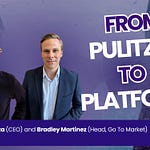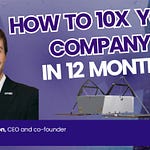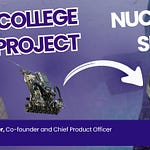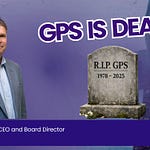SOF Week Part II: How Early Stage Companies’ Strategies Played Out
Last week, we connected with the founders of EdgeRunner AI, Aurum Systems, and Distributed Spectrum before they made their way to Tampa for SOF Week.
In this follow-up episode, we hear how they performed.
Edgerunner AI: From Education to Validation
Original Objective: Meet "shot callers" (decision-makers at multiple levels) and educate the market about edge AI capabilities that operate without internet connectivity.
Results Achieved:
Secured high-level meetings with SOCOM J3
Generated immediate follow-up meetings scheduled in Tampa
Validated that operators were "blown away" by internet-free AI capabilities
Announced Series A funding during the event
Demonstrated product at both their own booth and through Second Front Systems partnership
Key Learning: "Try to line up as many meetings as you can. Let people know you're going to be there and ask them to set aside time." The educational component worked—operators immediately wanted the technology once they understood it was possible.
Evolution: The company is moving from "zero to one" in their market presence and aspires to use conference presence as a yard stick as they scale up (“we want to be on the big stage right next to Anduril.”)
Aurum Systems: Discovery Through Direct Engagement
Original Objective: Achieve a "public launch," validate technology with operators, and receive initial feedback from acquisition professionals.
Results Achieved:
Received validation that they were "20 to 30% ahead of anything else we've seen" from acquisition professionals
Discovered entirely new use cases for their 3D reconstruction technology through direct operator conversations
Successfully demonstrated their Atlas platform for UAV autonomy
Participated in pitch competitions and secured good booth traffic in Accelerator Alley
Key Learning: The value of unexpected discovery—Jason noted that "everyone sees [our products] in a different light" based on their specific problem sets. This led to previously unconsidered applications of their technology.
Resource Constraint: Myles identified a critical limitation: "We had us and one of our coworkers helping us. That was still not enough." They plan to bring more team members next year to maximize event value.
Distributed Spectrum: Operational Efficiency at Scale
Original Objective: Connect with three stakeholder groups—acquisition teams, operators, and potential partners—while maintaining operational flexibility.
Results Achieved:
Conducted real-time product demonstrations that led to immediate UI improvements
Received specific technical feedback that refined their user interface presentation
Maintained strategic flexibility without booth commitments
Successfully navigated the event solo due to last-minute team constraints
Key Learning: Alex Wulff's approach of finding "good places to sit down with people to actually have a real conversation" proved more effective than previous years' ad hoc lobby meetings.
Strategic Evolution: As a more mature company (third SOF Week attendance), they're considering booth space once they have "enough resources beyond just me and my co-founders."
Universal Lessons for Defense Tech Founders
Despite being at different stages and levels of maturity, our founders had some common lessons that apply to all — we’ll highlight them here:
1. Pre-Event Preparation Is Everything
All successful interactions stemmed from proactive outreach. Companies that scheduled meetings in advance were more likely to achieve their primary objectives.
2. Resource Effectively - with Number and Nature of Participants
Smaller teams faced difficult trade-offs between booth manning, meeting attendance, and exploratory conversations. The optimal approach appears to scale team presence with company resources and objectives.
3. Face-to-Face Interaction Remains Irreplaceable
Despite digital alternatives, immediate feedback loops and relationship building only occurred through in-person engagement. The ability to demonstrate technology and receive real-time input proved invaluable.
4. External Factors Impact Event Dynamics
Companies noted that DOGE travel restrictions and SOF Week's alternating scale (large/small years) affected attendance patterns. Successful founders adapt their strategies to current realities rather than fixed expectations.
5. Success Metrics Evolve with Company Maturity
First-time attendees focused on validation and market education, while repeat attendees leveraged established relationships for strategic refinement. Each company's definition of success matched their stage in crossing the valley of death.
Looking Forward: Adaptive Strategies
The most successful companies treated SOF Week as part of an iterative learning process. Edgerunner AI plans to evolve from educational evangelism to established market presence. Aurum Systems will scale their team presence to maximize surface area for opportunity. Distributed Spectrum will consider physical booth space as their resources grow.
This debrief reinforces that defense industry events serve multiple functions: market validation, relationship building, product refinement, and competitive intelligence. The founders who approached SOF Week with clear objectives while remaining open to unexpected opportunities achieved the strongest results.
Thanks for tuning in to this special mini series!
Let us know what you think and if you want more of this going forward!
For more on the companies:
Aurum Systems: https://aurum.systems/
Distributed Spectrum: https://www.distributedspectrum.com/
EdgeRunner AI: https://www.edgerunnerai.com/










